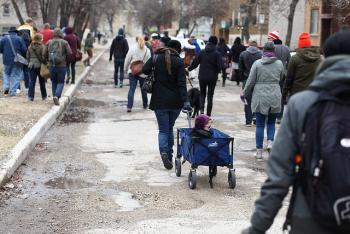Like this article? rabble is reader-supported journalism. Chip in to keep stories like these coming.
The province has invested widely in community development and "place-based" approaches to renewal and poverty reduction, with many positive results. Place-based approaches such as these are now being adopted in communities across the country as research shows that residents overwhelmed by poverty need complementary supports and resources close to home. Innovative, grassroots, community-led initiatives make a difference and are a wise public investment. Take the West Broadway neighbourhood as an example.
Twenty years ago, the historic urban neighbourhood immediately west of Manitoba's Legislative grounds was noteworthy for its high concentration of poverty and incredibly low property values. Dubbed "Murder's Half Acre" at the time by an overzealous local newspaper reporter, West Broadway from the outside seemed dangerous and while crime rates were high that outsider's perspective did a great disservice to what has always been a very strong community. From the inside, West Broadway in 1997 was already one of the city's most cosmopolitan neighbourhoods, rich with personality and built to be walkable, high density and diverse. On May 1, 1997 residents and local stakeholders created the West Broadway Community Organization (WBCO), formalizing what had for years been a grass roots effort to bring positive change to the neighbourhood.
Governments and foundations began to invest in these efforts; the provincial government has been at the table the longest. Thanks to public investment in neighbourhood revitalization, WBCO was able to help with the creation of Art City, Greenheart Housing Coop, Broadway Neighbourhood Centre's Greenspace redevelopment, numerous infill housing projects, the protected bike lane on Sherbrook St, the Soup Bee Social Enterprise, Kikinaw Housing, and many other initiatives. WBCO has raised millions of dollars to improve deteriorating inner city housing stock, maintains and manages eight community garden sites, houses the 1,200-member/15 year-old Good Food Club, provides Manitoba's only outreach program to rooming house tenants and landlords, and administers $50,000 in small grants to a wide spectrum of local projects every year.
Manitoba is the only province that has made sustained investment to foster neighbourhood renewal, creating opportunities for citizens marginalized by poverty to become involved in local neighbourhood revitalization, with very positive results. Poverty rates are on the decline in the inner city of Winnipeg. In 1996, 46 percent of residents lived below the low income cut off, this declined to 29 percent in 2011. These gains can be attributed to sustained public investment and long-term commitment from the provincial policy framework.
Neighbourhoods Alive! (NA!), is an interdepartmental program providing funding to Community or Neighbourhood Renewal Corporations (NRCs) and program funding to communities with indicators of low income and decline. NA! funds 13 NRCs operating in urban and rural communities in Manitoba. Renewal corporations are supported by the provincial government in Thompson, Brandon, Flin Flon, The Pas, Selkirk, Dauphin, Portage la Prairie. In Winnipeg the following low-income neighbourhoods are funded: Central, Daniel McIntyre/St. Matthews, North End Spence, West Broadway, and Chalmers. Over the past 15 years the province, through NA! has invested $72 million in neighbourhood and municipal renewal efforts.
NRCs create spaces for neighbourhood residents to participate in identifying and addressing the challenges they see around them. This is participatory democracy; residents and stakeholders in NRC communities have direct influence over decisions that affect their lives. In our current electoral democracy, opportunities to participate in policy and program development are rare, especially for those marginalized because of economic status, race, ability, age and gender. There are multiple ways for people to get involved: by learning about local services at a block party, participating at a community forum or volunteering on the board of directors of a local organization. In the process, people build skills, relationships and community, with proven results.
The latest of the NA! program found that provincial funding contributed greatly to public spaces and amenities, capacity-building, empowerment, well-being, improved housing stock, tenant-landlord relations and enhanced perception of these communities through neighbourhood revitalization efforts.
Sustained investment is needed to address the root causes of poverty and aging infrastructure. The evaluation also found that the original neighbourhoods included in the NA! program continue to experience issues related to safety, economic hardship and lack of affordable housing and that neighbourhood revitalization work is still needed.
The level of funding available to NRCs through Neighbourhoods Alive! has not changed significantly since the beginning of this program in 2000. And these funding levels have been eroded through inflation. The province responded to requests for longer-term funding for successful projects and created multi-year agreements through the Non-Profit Organization (NPO) Strategy. However NRCs continue to rely also on short-term project funding to meet community need.
These funding mechanisms should be strengthened, through enhanced core and administrative funding indexed to inflation. This will enable NRCs to better support grassroots efforts and create greater stability for neighbourhood renewal corporations' core activities.
Next year will mark the 20th anniversary of West Broadway Community Organization (WBCO). To continue this and other important work we hope all political parties this provincial election will see the wisdom in long-term investments for community-led renewal for a more inclusive and sustainable future.
Greg Macpherson is the Executive Director of the West Broadway Community Organization and Molly McCracken is the Director of CCPA-MB.
Photo: steve/flickr
Like this article? rabble is reader-supported journalism. Chip in to keep stories like these coming.




Comments
Do
Don't